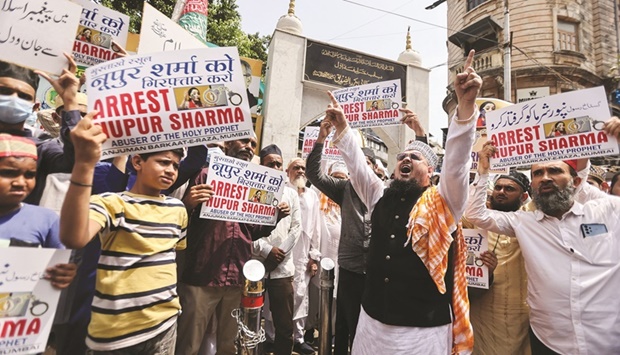Anger in the Middle East spread yesterday over comments made by an official of India’s ruling party about the Prophet Muhammad (may blessings and peace be upon him), with various countries summoning New Delhi’s envoy and a Kuwaiti supermarket removing Indian products.
The United Arab Emirates became the latest country to voice its condemnation of the remarks, saying they were “contrary to moral and humanitarian values and principles.”
The UAE’s foreign ministry underlined the “need for respecting religious symbols... and countering hate speech”, state news agency WAM reported.
Saudi Arabia, Qatar, Oman and other countries in the region, as well as the influential Al-Azhar University in Cairo, have condemned the comments by a spokeswoman for Indian Prime Minister Narendra Modi’s party, who has since been suspended.
In Kuwait, supermarket workers piled Indian tea and other products into trolleys in a protest against comments denounced as “Islamophobic”.
At the Al-Ardiya Co-Operative Society just outside Kuwait City, sacks of rice and shelves of spices and chilies were covered with plastic sheets. “We have removed Indian products”, signs in Arabic read.
“We, as a Kuwaiti people, do not accept insulting the Prophet,” Nasser al-Mutairi, CEO of the store, said. An official at the chain said a company-wide boycott was being considered.
Bharatiya Janata Party spokeswoman Nupur Sharma made controversial comments about the Prophet sparking a furore. Sharma’s remarks during a televised debate last week were blamed for clashes in an Indian state and prompted demands for her arrest.
Anger spread overseas to Muslim countries about the remarks.
Modi’s party, which has frequently been accused of acting against the country’s Muslim minority, on Sunday suspended Sharma for expressing “views contrary to the party’s position” and said it “respects all religions”.
Sharma said on Twitter: “If my words have caused discomfort or hurt religious feelings of anyone whatsoever, I hereby unconditionally withdraw my statement.”
On Sunday, Qatar demanded that India apologise for the “Islamophobic” comments, as India’s Vice-President Venkaiah Naidu visited the Gulf state in a bid to bolster trade.
Iran followed Qatar and Kuwait by summoning the Indian ambassador to protest in the name of “the government and the people”, state news agency Irna said late on Sunday.
Al-Azhar University, said the comments were “the real terrorism” and “could plunge the entire world into deadly crisis and wars”.
The Saudi-based Muslim World League said the remarks could “incite hatred”, while Saudi Arabia’s General Presidency of the Affairs of the Grand Mosque and the Prophet’s Mosque called them a “heinous act”.
In further criticism of the Indian official, the Gulf Co-operation Council, an umbrella group for the six Gulf countries, “condemned, rejected and denounced” her comments.
Bahrain also welcomed the BJP’s decision to suspend Sharma over “provocation to Muslims’ feelings and incitement to religious hatred”.
Gulf countries are a major destination for India’s overseas workers, accounting for 8.7mn out of a worldwide total of 13.5mn, Indian foreign ministry figures show.
They are also big importers of produce from India and elsewhere, with Kuwait importing 95% of its food according to the trade minister.
Kuwaiti media have reported that the government asked New Delhi for an exemption from India’s surprise ban on wheat exports over food security and inflation worries.

People holding placards shout slogans demanding the arrest of Bharatiya Janata Party (BJP) member Nupur Sharma for her controversial comments, on a street in Mumbai, yesterday.
